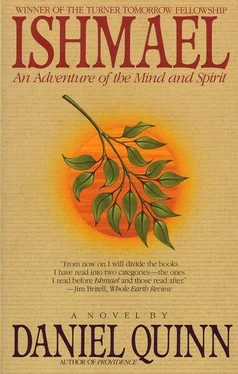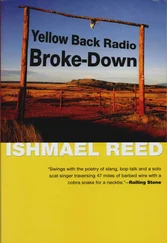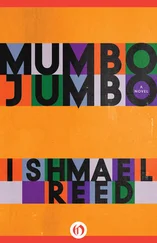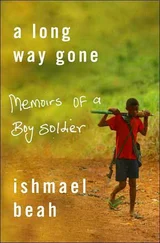“That’s what makes the story worth knowing?”
“Yes.”
“I’m glad to hear it. Now go away and come back when you can explain what makes the other story worth knowing.”
“I don’t need to go away. I can explain it now.”
“Go ahead.”
“People can’t just give up a story. That’s what the kids tried to do in the sixties and seventies. They tried to stop living like Takers, but there was no other way for them to live. They failed because you can’t just stop being in a story, you have to have another story to be in.”
Ishmael nodded. “And if there is such a story, people should hear about it?”
“Yes, they should.”
“Do you think they want to hear about it?”
“I don’t know. I don’t think you can start wanting something till you know it exists.”
“Very true.”
“And what do you suppose this story is about?”
“I have no idea.”
“Do you suppose it’s about hunting and gathering?”
“I don’t know.”
“Be honest. Haven’t you been expecting some noble paean to the mysteries of the Great Hunt?”
“I’m not aware of expecting anything like that.”
“Well, you should at least know that it’s about the meaning of the world, about divine intentions in the world, and about the destiny of man.”
“Yes.”
“As I’ve said half a dozen times, man became man enacting this story. You should remember that.”
“Yes, I do.”
“How did man become man?”
I examined that one for booby traps and gave it back. “I’m not sure what the question means,” I said. “Or rather I’m not sure what kind of answer you want. Obviously you don’t want me to say that man became man by evolving.”
“That would just mean that he became man by becoming man, wouldn’t it?”
“Yes.”
“So the question is still there waiting to be answered: How did man become man?”
“I suppose it’s one of those very obvious things.”
“Yes. If I gave you the answer, you’d say, ‘Oh. Well of course, but so what?’ ”
I shrugged, defeated.
“We’ll have to approach it obliquely then—but keep it in mind as a question that needs answering.”
“Okay.”
“According to Mother Culture, what kind of event was your agricultural revolution?”
“What kind of event… I’d say that, according to Mother Culture, it was a technological event.”
“No implication of deeper human resonances, cultural or religious?”
“No. The first farmers were just neolithic technocrats. That’s the way it’s always seemed.”
“But after our look at chapters three and four of Genesis, you see there was a great deal more to it than Mother Culture teaches.”
“Yes.”
“Was and is a great deal more to it, of course, since the revolution is still in progress. Adam is still chewing the fruit of that forbidden tree, and wherever Abel can still be found, Cain is there too, hunting him down, knife in hand.”
“That’s right.”
“There’s another indication that the revolution goes deeper than mere technology. Mother Culture teaches that, before the revolution, human life was devoid of meaning, was stupid, empty, and worthless. Prerevolutionary life was ugly. Detestable.”
“Yes.”
“You believe that yourself, don’t you?”
“Yes, I suppose I do.”
“Certainly most of you believe it, wouldn’t you say?”
“Yes.”
“Who would be the exceptions?”
“I don’t know. I suppose… anthropologists.”
“People who actually have some knowledge of that life.”
“Yes.”
“But Mother Culture teaches that that life was unspeakably miserable.”
“That’s right.”
“Can you imagine any circumstances in which you yourself would trade your life for that sort of life?”
“No. Frankly, I can’t imagine why anyone would, given the choice.”
“The Leavers would. Throughout history, the only way the Takers have found to tear them away from that life is by brute force, by wholesale slaughter. In most cases, they found it easiest just to exterminate them.”
“True. But Mother Culture has something to say about that. What she says is that the Leavers just didn’t know what they were missing. They didn’t understand the benefits of the agricultural life, and that’s why they clung to the hunting–gathering life so tenaciously.”
Ishmael smiled his sneakiest smile. “Among the Indians of this country, who would you say were the fiercest and most resolute opponents of the Takers?”
“Well… I’d say the Plains Indians.”
“I think most of you would agree with that. But before the introduction of horses by the Spanish, the Plains Indians had been agriculturalists for centuries . As soon as horses became readily available, they abandoned agriculture and resumed the hunting–gathering life.”
“I didn’t know that.”
“Well, now you do. Did the Plains Indians understand the benefits of the agricultural life?”
“I guess they must have.”
“What does Mother Culture say?”
I thought about that for a while, then laughed. “She says they didn’t really understand. If they had, they would never have gone back to hunting and gathering.”
“Because that’s a detestable life.”
“That’s right.”
“You can begin to see how thoroughly effective Mother Culture’s teachings are on this issue.”
“True. But what I don’t see is where this gets us.”
“We’re on our way to discovering what lies at the very root of your fear and loathing of the Leaver life. We’re on our way to discovering why you feel you must carry the revolution forward even if it destroys you and the entire world. We’re on our way to discovering what your revolution was a revolution against .”
“Ah,” I said.
“And when we’ve done all that, I’m sure you’ll be able to tell me what story was being enacted here by the Leavers during the first three million years of human life and is still being enacted by them wherever they survive today.”
Having spoken of survival, Ishmael shuddered and sank down into his blankets with a kind of moaning sigh. For a minute he seemed to lose himself in the tireless drumming of rain on the canvas overhead, then he cleared his throat and went on.
“Let’s try this,” he said. “Why was the revolution necessary ?”
“It was necessary if man was to get somewhere.”
“You mean if man was to have central heating and universities and opera houses and spaceships.”
“That’s right.”
Ishmael nodded. “That sort of answer would have been acceptable when we began our work together, but I want you to go deeper than that now.”
“Okay. But I don’t know what you mean by deeper.”
“You know very well that for hundreds of millions of you, things like central heating, universities, opera houses, and spaceships belong to a remote and unattainable world. Hundreds of millions of you live in conditions that most people in this country can only guess at. Even in this country, millions are homeless or live in squalor and despair in slums, in prisons, in public institutions that are little better than prisons. For these people, your facile justification for the agricultural revolution would be completely meaningless.”
“True.”
“But though they don’t enjoy the fruits of your revolution, would they turn their backs on it? Would they trade their misery and despair for the sort of life that was lived in prerevolutionary times?”
“Again, I’d have to say no.”
Читать дальше
Конец ознакомительного отрывка
Купить книгу












